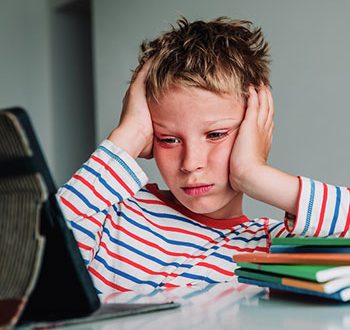
Excessive internet use can sound like an intimidating term when you first hear it. It can also seem as if it is a relatively new phenomenon, but excessive internet use is a topic that has been known to psychologists for over 20 years. As we regularly say at Zeeko, the internet is a fantastic resource and a powerful tool that has become a very necessary part of our everyday lives. Therefore it is important to strike the correct balance around your child's internet use.
Being able to identify excessive internet use early on is crucial in tackling the condition. Dr Kimberly Young is a psychologist who has specialised in this area since 1995, and has pioneered the study of this condition. She has identified symptoms in children which are key indicators of a larger problem
- Agitation and anger when interrupted online
- Irritable if not allowed online
- Loses track of time online
- Sacrifices sleep to spend time online
- Neglects fundamental parts of their daily lives to spend time online, such as homework, hobbies or chores
- Prefers to spend time online instead of with family and friends
If you spot these symptoms in your child, it is important to seek the help of a medical professional, who can refer the child on for specialist help if necessary. The common response towards excessive time online is to simply confiscate the device, either temporarily or indefinitely, but this can actually do more harm than good if the child has been spending a lot of time online. They will internalise negative feelings towards you as the parent, and you may be perceived as ‘the enemy’. Withdrawal symptoms can also be extreme, causing anxiety, anger, irritability and depression. Instead of this knee-jerk and abrupt reaction, take a gradual approach; slowly withdraw the device by gradually reducing the time you will allow them to spend online. Discuss the negative consequences of spending so much time online, and suggest offline alternatives that you can both do together.
Preventing Excessive Internet Use – The 5:1 Rule
We have conducted extensive research into excessive internet use, the habits amongst children in Ireland and the optimum time spent online in order to come up with an appropriate guideline in this regard. As a result, we are pioneering the 5:1 Rule; 5 hours of real world activities to 1 hour of ‘screen time’.
In order to use the 5:1 Rule, it is important to understand what we are referring to when we say ‘screen time’; the time spent looking at a laptop, PC, TV, smart phone, tablet, iPod etc. All of these devices involve ‘blue light’ technology, to which children should not be overexposed. It causes suppression of the hormone, melatonin, which is also known as the ‘sleep hormone’. Excessive exposure to this ‘blue light’ will disturb your child’s sleep patterns. It is highly recommended that screens are turned off an hour before bedtime, and that there are no screens in the bedroom. Experts advise that ‘blue light’ exposure at or around bedtime impedes upon sleep quality, and can have a significant impact on the child’s learning capacity, by affecting memory consolidation (the process through which new information is committed to the brain). In other words, a good night’s sleep is fundamental in optimising memory consolidation and learning (The American Physiological Society, 2013).
In addition, we recommend downloading a piece of software called f.lux (also available as an app). The programme is free to avail of, and removes the blue light from your screen in line with the natural sunset, thus mimicking natural sunlight patterns. This minimises the impact of ‘screen time’ after sunset upon melatonin production, which in turn reduces the impact of ‘screen time’ upon sleep patterns, so it is a valuable tool for children and adults alike.
The Zeeko Internet Safety Guide provides more comprehensive information on the topic of excessive internet use and you can purchase a copy of the Guide here: https://www.kickstarter.com/projects/zeeko/zeeko-internet-safety-guide
To keep up to date with our work at Zeeko keep an eye on our social media channels. We are also running a Parent Crash Course on 27th February and the 23rd April 2016 and you can find out more about these on this website.
Explore Zeeko’s Home Page to discover our mission on the About Us Page, innovative Phone Blocking System, and engaging Phoenix Quest 10 programme. We provide Internet Safety Seminars, the Zeeko Report Card, and the Magical Leaders Choose Country initiative, alongside insights from our Digital Trend Report. Stay connected with us on Facebook and Instagram for updates.



No Comments Yet